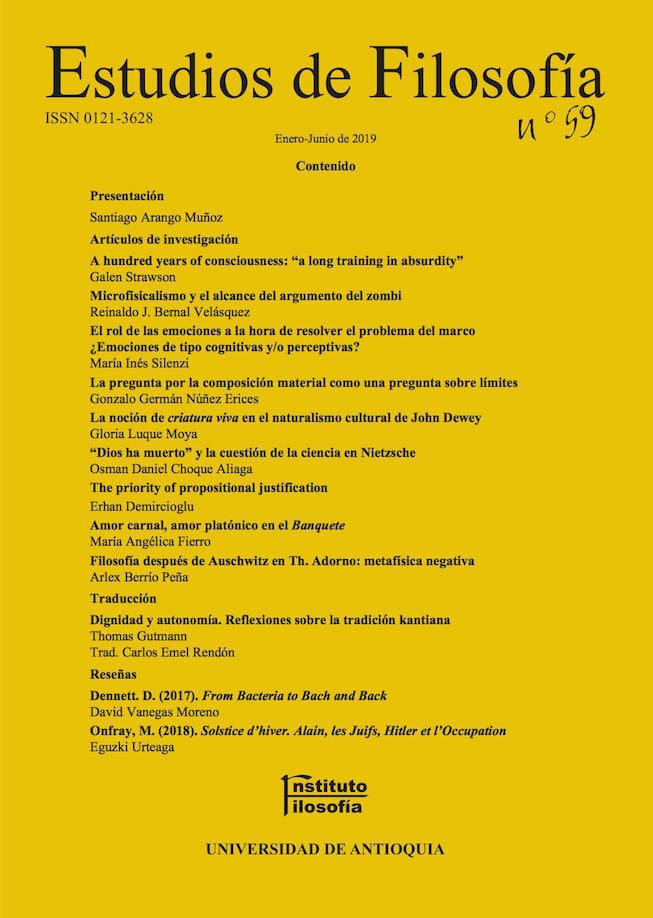Dennett. D. (2017). From Bacteria to Bach and Back
DOI:
https://doi.org/10.17533/udea.ef.n59a12Keywords:
evolution, language, cognitionAbstract
Por más de medio siglo Daniel Dennett ha estado a la vanguardia de la filosofía de la mente, ciencias cognitivas y biología evolutiva. En su más reciente libro de nuevo nos invita a poner en uso sus bombas de intuición y extrañas inversiones del razonamiento para lograr transformar los misterios de la mente en problemas; estos últimos, a diferencia de los primeros, ofrecen al menos una posibilidad de resolución. El presente ensayo da un bird-eye view del argumento que da cabida a la aliteración del título. Pero en lugar de partir de las bacterias, llegar a Bach y regresar; comenzaremos desde el proceso ciego de la evolución por medio de la selección natural, llegando hasta la mente humana, y, como propone Dennett, regresaremos de nuevo al punto de partida.
Downloads
References
Dawkins, R. (1976). The Selfish Gene. Oxford: Oxford University Press.
Dawkins, R. (1986). The Blind Watchmaker. New York: Norton & Company, Inc.
Darwin, C. (1859). On the Origin of Species. Washington Square: New York University Press.
Dennett, D. (1991). Consciousness Explained. Little Brown.
Dennett, D. (1995). Darwin's Dangerous Idea: Evolution and the Meanings of Life. New York: Simon and Schust.
Dennett, D. (1996). Kinds of Minds: Towards an Understanding of Consciousness. Basic Books.
Dennett, D. (2003). Freedom Evolves. Viking Press.
Dennett, D. (2009). Darwin’s “Strange Inversion of Reasoning”. Proceedings of the National Academy of Sciences of the United States of America, 106, 10061–10065.
Dennett, D. (2013a). Intuition Pumps and Other Tools for Thinking. W. W. Norton & Company.
Dennett, D. (2013b). Turing’s “Strange Inversion of Reasoning”. In Barry Cooper, S. & van Leeuwen, J. (Eds.). Alan Turing: His Work and Impact. Amsterdam: Elsevier.
Dennett. D. (2017). From Bacteria to Bach and Back. W. W. Norton & Company.
Fodor, J. & Piattelli-Palmarini, M. (2010). What Darwin Got Wrong. Farrar, Straus and Giroux.
Mithen, S. (1996). The Prehistory of the Mind: A Search for the Origins of Art, Religion, and Science. London: Thames and Hudson.
Sterelny, K. (2012). The Evolved Apprentice. MIT Press.
Tomasello, M. (1999). The Cultural Origins of Human Cognition. Harvard University Press.
Turing, A. (1960). Computing Machinery and Intelligence. Mind, 59, 433-460.
Pinker, S. (2010). The cognitive niche: coevolution of intelligence, sociality, and language. Proceedings of the National Academy of Science USA, 107, 8893-8999.
Wallace, A. (1870). Contributions to the Theory of Natural Selection. London: Macmillan.
Published
How to Cite
Issue
Section
Categories
License
Copyright (c) 2019 David Vanegas Moreno

This work is licensed under a Creative Commons Attribution-NonCommercial-ShareAlike 4.0 International License.
Authors who publish with this journal agree to the following terms:
1. The Author retains copyright in the Work, where the term "Work" shall include all digital objects that may result in subsequent electronic publication or distribution.
2. Upon acceptance of the Work, the author shall grant to the Publisher the right of first publication of the Work.
3. The Author shall grant to the Publisher a nonexclusive perpetual right and license to publish, archive, and make accessible the Work in whole or in part in all forms of media now or hereafter known under a Creative Commons Attribution-NoCommercia-ShareAlike (CC BY-NC-SA 4.0), or its equivalent, which, for the avoidance of doubt, allows others to copy, distribute, and transmit the Work under the following conditions: (a) Attribution: Other users must attribute the Work in the manner specified by the author as indicated on the journal Web site;(b) Noncommercial: Other users (including Publisher) may not use this Work for commercial purposes;
4. The Author is able to enter into separate, additional contractual arrangements for the nonexclusive distribution of the journal's published version of the Work (e.g., post it to an institutional repository or publish it in a book), as long as there is provided in the document an acknowledgement of its initial publication in this journal;
5. Authors are permitted, and Estudios de Filosofía promotes, to post online the preprint manuscript of the Work in institutional repositories or on their Websites prior to and during the submission process, as it can lead to productive exchanges, as well as earlier and greater citation of published work (see The Effect of Open Access). Any such posting made before acceptance and publication of the Work is expected be updated upon publication to include a reference to the Estudios de Filosofía's assigned URL to the Article and its final published version in Estudios de Filosofía.















